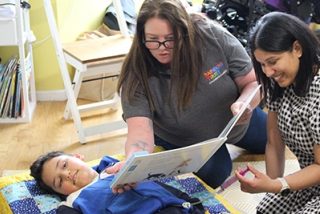Here are some specific strategies to help you look after your mental health while also caring for your child:
Build a support network:
Surrounding yourself and your family with individuals (both professional and not) is so important when caring for a seriously ill child. If possible, stay connected with friends and family members or trusted professionals who can provide emotional and practical support when and if needed. Ask for help with practical tasks, such a food shops or childcare – this can help retain some routines and give you some much needed time off.
Prioritise self-care.
It is okay to prioritise your own well-being and do things to help look after yourself. This looks different on everyone, but here are some ideas:
- Spending time outside.
- Spend time doing things that you enjoy. This could be reading, watching a film, or if you’re short on time, listening to an audiobook/podcast.
- A long bath
- Having breaks of respite care can be a good opportunity to do things for yourself.
Reach out for help.
Asking for help can be dauting and admitting that you’re struggling is sometimes the hardest part. Let others help you carry the weight of the situation – you are never alone. Don’t be afraid to ask for help if you are struggling – at the end of this article there is a section signposting to places you can turn to for support if you are in need.
Accepting it’s okay to feel a range of emotions.
Families caring for a seriously ill child may feel a whole range of emotions. It is important to remember that no one feeling is a bad feeling. It is okay to feel how you feel, sometimes you might feel happy, and you are allowed to do so. Some days may feel far more challenging, and that is okay too. You have permission to feel how you feel.
Get back to basics.
Sometimes it can be the simplest of things that can provide stability in an unsettling time, such as getting enough sleep and a little bit of light exercise - this can help maintain routines and promote physical wellbeing. This could also be something like eating food you enjoy, making your favourite meal for dinner, or calling a friend for a catch up.
Remember that looking after your mental health is not selfish; it's a vital part of being able to provide the best care for your seriously ill child. It's okay to ask for help and prioritise your well-being. Your child's well-being is intertwined with your own, so taking care of yourself ultimately benefits both of you.


















